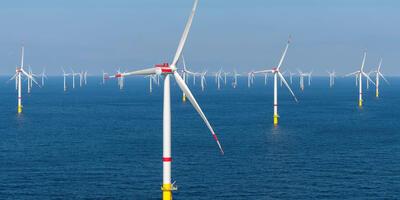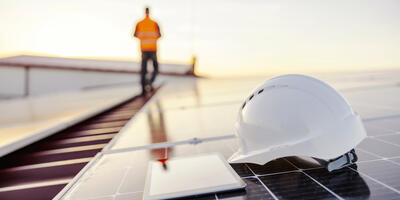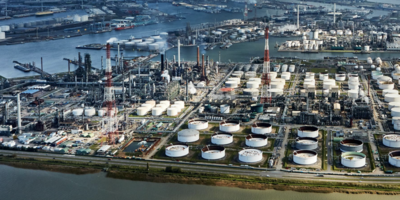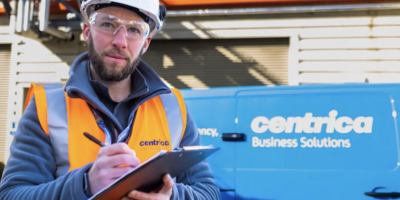
Energy
The future of smart energy is shaped by the quest for enhanced sustainability, cost effectiveness as well as ever-more secure and integrated systems. Luckily, you don’t need to face this daunting task alone. Flanders, Belgium’s northern region, is a great match for each of these building blocks. From sustainable energy and biomass to smart grids, cleantech and environmental technology: Flanders is buzzing with energetic expertise that you can rely on.
Quick facts about the energy industry in Flanders
Flanders' energy ecosystem seeks to make headway in the areas of alternative energy sources and intelligent energy management. Highlighting a variety of proof points, here are some facts and figures:
- Flanders has played a role in the development of wind turbine tech from square one: one of the world’s first large-scale wind energy parks was built in 1986 in Zeebrugge, West Flanders (source: Ministry of Public Works, 1986 press release).
- The share of electricity demand met by wind energy in Belgium and Flanders as a region grew to 12.5% in 2022 (source: Elia Group, 2023).
- With 656 patent filings in 2022, Flanders has made the most prolific contributions to innovating within the domain of renewable energy (source: 2022 Cleantech Flanders report).
- Offshore wind development will contribute between EUR 1 billion and EUR 1.5 billion per year to the GDP of Belgium by 2030 (source: Belgian Offshore Platform, 2021).
- Belgium ranks 5th worldwide for installed offshore wind capacity and 2nd worldwide for offshore wind production per inhabitant (source: Belgian Offshore Platform, 2021).
- Belgium’s offshore wind energy industry accounts for 14,000 direct and indirect jobs created by companies active in the design, construction, management and maintenance of wind energy parks. By 2030, this number is estimated to reach 24,000 jobs.
Innovative hub for environmental tech and sustainability
Cleantech, biomass production, the circular economy and other sustainable tech innovations in the smart energy value chain: you name it, and Flanders has the expertise for it. What’s more, the various local industry players and research organizations that specialize in these fields are easily accessible and open for collaboration on smart energy initiatives.
Get the full scoop on environmental tech and sustainability in Flanders.
R&D expertise: from renewable energy to smart grids
Flanders is home a broad variety of companies and organizations with expertise in some of the most advanced smart energy niches, from renewable energy to smart grids and energy storage, cogeneration, network integration and much more. The non-exhaustive list below gives you a great starting point.
Innovation clusters
Flanders is home to spearhead clusters that unite the private, public and academic sectors in long-term, multidisciplinary and collaborative innovation projects. Two of these spearhead clusters are particularly relevant for smart energy: Flux50 and The Blue Cluster.
Flux50, powering smart energy
Flanders’ spearhead cluster for smart energy unites companies, knowledge institutions, legal partners and financial institutes to send innovative and positive shockwaves through the energy landscape. In doing so, Flux50 aims to help set up an effective energy system for future generations – by focusing on clean energy solutions and by empowering local energy communities as well as large-scale production.
The Blue Cluster, turning the blue economy tide
Flanders’ spearhead cluster for the blue economy aims to develop and promote sustainable economic activities related to the sea. In doing so, the Blue Cluster adopts an ‘ecosystem approach’ by putting the cohesion between ecology and economy first in everything it does. One of the cluster’s focus domains is effective production and storage of renewable offshore energy. It does so by promoting the development of technologies for wind turbines, wave and tidal energy, floating solar parks and so on (while connecting all of this to energy storage and freshwater production).
(Strategic) research centers and research groups
As sustainable energy and smart tech are some of Flanders’ main innovation priorities, it’s no surprise that various of the region’s strategic research centers and university research groups offer R&D support related to these themes:
- imec – Specializing in nanotech and digital R&D, imec also focuses on technologies that are fundamental to developing smart grids and using renewable energy more efficiently.
- VITO – A multidisciplinary research center, VITO focuses on cleantech domains, including sustainable energy. Its researchers provide expertise in energy-efficient buildings and intelligent networks for sustainable urban environments. This includes smart grids, advanced district heating and cooling, electrical storage interfaces, clean vehicles and fuels, etc.
- Flanders Make – Focusing on production and product optimization technologies, Flanders Make pays particular attention to industrial energy efficiency solutions, next-generation energy technologies, smart monitoring systems and more.
- EnerGhentIC – An interdisciplinary community of UGent researchers, EnerGhentIC offers research, valorization, education and training services, while supporting and creating awareness on society’s energy transition.
- MOBI – This VUB research group is dedicated to electromobility research and sustainable mobility and logistics.
Incubators and innovation catalysts
Other sector-specific research centers, knowledge platforms and research groups include:
- EnergyVille – unites the expertise of VITO (energy tech development), imec (nanotech) and Leuven University, making it the go-to center of expertise for sustainable energy, smart energy systems, energy-efficient buildings, etc.
- Cleantech Flanders – informs industry about the latest cleantech trends, assists in the international marketing of cleantech solutions, and shares cleantech opportunities with like-minded companies and scale-ups.
- WaterstofNet – develops sustainable hydrogen energy storage solutions with the help of industry players and public authorities.
- GreenVille – all-inclusive cleantech service center for green businesses.
|
Case in point: next-generation solar panels Coordinated by Flanders-based innovation hub EnergyVille and supported by the EU’s Horizon Europe funding program, the PERCISTAND consortium was the first to achieve an energy efficiency of 25% with a thin-film solar cell. This means that the wafer-thin solar cell generates as much energy as a traditional silicon solar cell, while being smaller in size: an innovative result that paves the way for the production of next-generation solar panels. |
|
Case in point: Flanders’ ports go green Flanders’ seaports are known for their strategic location and excellent services. But did you know that they also go to great lengths when it comes to clean energy and cleantech initiatives? To highlight just two examples:
|
Financing your smart energy business in Flanders
If you decide to establish activities or headquarters in Flanders, your business can reap the rewards of:
- government subsidies and support for investments in R&D and innovation, strategic transformation, ecological efforts, growth and other domains.
- tax incentives to fund a broad range of business activities.
- fiscal options to help you cut labor costs.
Request a free copy of our brochure to discover more about government support in Flanders.
Tax incentives for research-intensive activities
Flanders offers access to several tax incentives that are particularly relevant to research-intensive activities such as smart energy. Examples include:
- the innovation income deduction – up to 85% of a company’s net innovation income can be exempt from corporate tax.
- the R&D investment deduction – 13.5% of the investment value (at once) or 20.5% of the annual depreciation (staggered).
- the R&D payroll tax exemption – 80% of the withholding tax on professional income for researchers and academic personnel.


